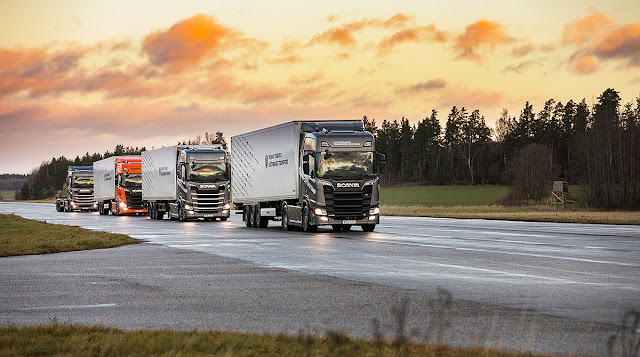The Environmental Benefits of Truck Platooning: A Sustainable Solution
The environmental benefits of truck platooning are significant, making it a sustainable solution for the transportation industry. By optimizing vehicle efficiency and reducing emissions, truck platooning contributes to a greener and more sustainable future. Here are some key environmental benefits of truck platooning:
Reduced Fuel Consumption: Truck
platooning improves fuel efficiency by reducing aerodynamic drag and optimizing
vehicle spacing. When trucks travel in close formation, they experience reduced
air resistance, leading to lower fuel consumption. Studies have shown that
platooning can result in fuel savings of up to 10% for the trailing vehicles
and around 4-5% for the lead vehicle. This reduction in fuel consumption
translates into decreased greenhouse gas emissions and a more sustainable
transportation system.
The global
truck platooning market size is estimated to be valued at US$ 2.52 Billion in 2023 and is expected to exhibit a CAGR of 30.1% between 2023 and 2030.
Lower Emissions: The improved
fuel efficiency achieved through truck platooning directly translates into
reduced emissions. As trucks consume less fuel, there is a corresponding
decrease in carbon dioxide (CO2) emissions, which contribute to climate change.
Additionally, truck platooning can help reduce other harmful emissions, such as
nitrogen oxides (NOx) and particulate matter (PM), which have adverse effects
on air quality and human health.
Traffic Flow Optimization: By
maintaining consistent and synchronized movement, truck platooning helps reduce
traffic congestion. The smooth flow of vehicles minimizes the time spent idling
or in stop-and-go traffic, thereby reducing emissions associated with
congestion. Additionally, the optimized use of road infrastructure helps
alleviate traffic bottlenecks and improves overall road efficiency, leading to
reduced emissions from vehicles stuck in traffic.
Enhanced Sustainability in
Logistics: Truck platooning enables logistics companies to operate in a more
sustainable manner. By reducing fuel consumption and emissions, companies can
lower their environmental footprint and contribute to sustainability goals.
This can enhance their brand reputation, attract environmentally conscious
customers, and align with regulatory requirements related to emissions
reductions.
Potential for Alternative Fuels
and Electric Trucks: As the transportation industry shifts towards alternative
fuels and electric vehicles, truck platooning can facilitate the adoption of
these sustainable technologies. With a platooning system in place, the range
limitations of electric trucks can be mitigated. Trucks can recharge or refuel
as needed while remaining in the platoon, optimizing efficiency and reducing
overall energy consumption.
Infrastructure Optimization:
Truck platooning also benefits infrastructure planning and development. With a
reduced number of trucks on the road, the wear and tear on infrastructure are
minimized. This can result in cost savings for maintenance and repairs, as well
as extend the lifespan of roadways and bridges.
Truck platooning offers
compelling environmental benefits and represents a sustainable solution for the
transportation industry. By improving fuel efficiency, reducing emissions,
optimizing traffic flow, and promoting sustainability in logistics, truck
platooning contributes to a greener and more efficient future. Continued
research, development, and collaboration among industry stakeholders,
policymakers, and technology providers are essential for further advancing and
implementing truck platooning as a sustainable transportation solution.




Comments
Post a Comment